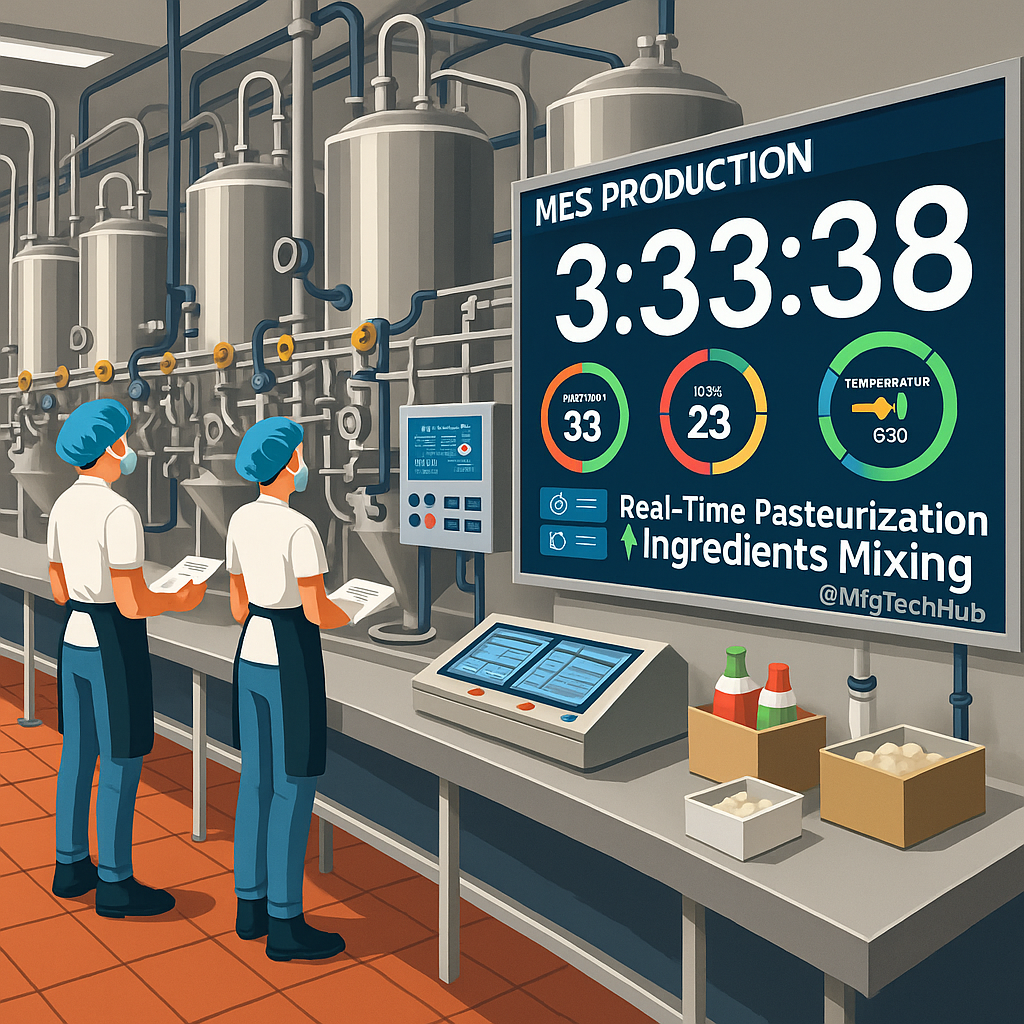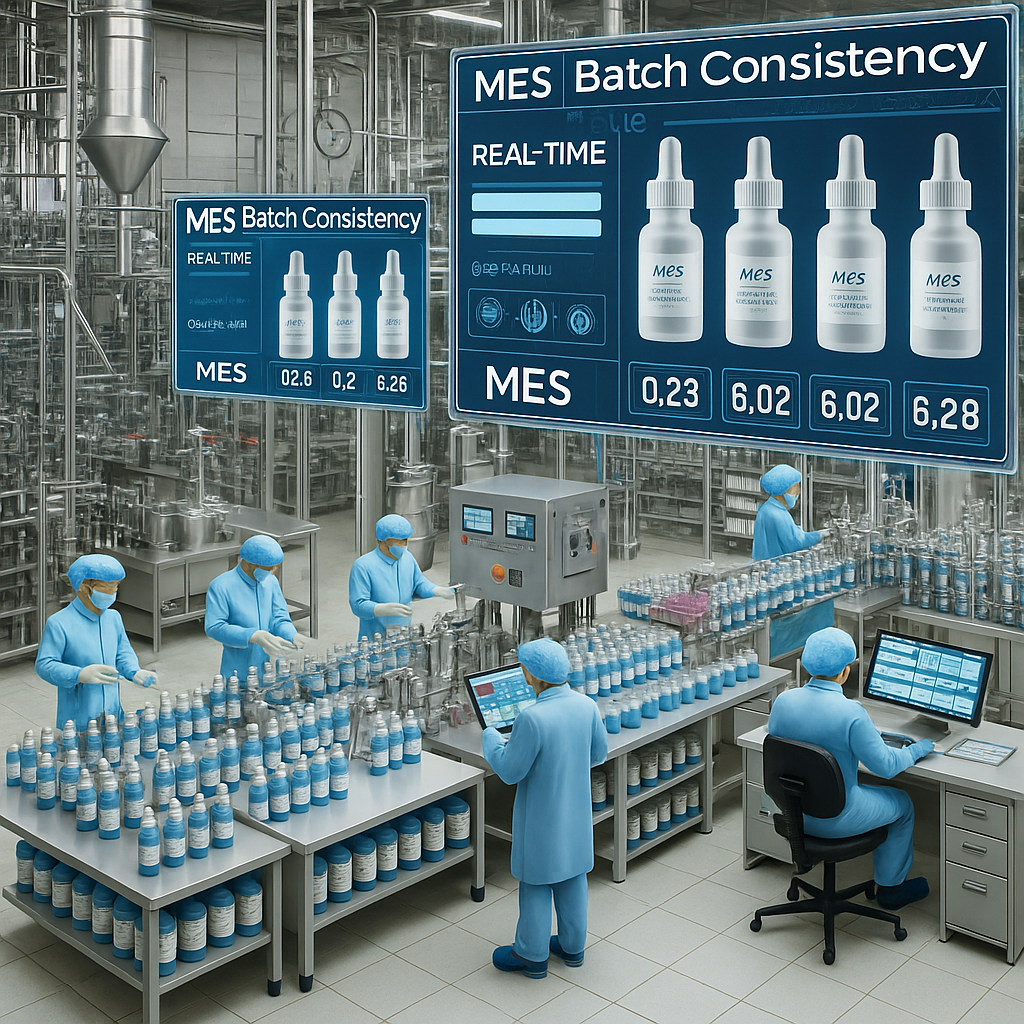MES Applications: Batch Manufacturing and Standards

A infographic showing a pharmaceutical or biotech lab using MES dashboards for monitoring production metrics, quality control, and batch tracking in a sterile environment
Introduction
Batch manufacturing is one of the most common production methods across industries such as pharmaceuticals, food and beverage, chemicals, and cosmetics. Unlike continuous manufacturing, where production flows non-stop, batch manufacturing divides production into measurable lots or units. This approach provides a higher level of flexibility and quality control, making it indispensable where precision and compliance are critical.
Managing batch processes, however, comes with challenges. Each stage of production—from raw material intake to final packaging—must be carefully tracked, documented, and verified. Errors or inconsistencies in just one stage can compromise product safety, delay delivery, and create regulatory risks. This is where the Manufacturing Execution System (MES) steps in. By providing real-time visibility, traceability, and control, MES ensures that batch production remains efficient, accurate, and compliant with international standards.
Key Features of MES in Batch Manufacturing

A infographic of a food and beverage production facility with MES dashboards monitoring pasteurization, mixing processes, and real-time production data
MES provides a wide range of features tailored for batch production. Its ability to synchronize recipes, track progress, and monitor quality in real time ensures production runs smoothly and meets industry expectations.
- Batch Scheduling and Management:
- Optimizes the use of equipment, raw materials, and labor by planning production batches in advance.
- Provides real-time progress monitoring, allowing managers to identify delays and reallocate resources quickly.
- Traceability:
- Tracks every material, intermediate stage, and finished good, ensuring end-to-end visibility.
- Supports rapid recall processes by providing detailed batch history records.
- Recipe and Formula Management:
- Stores and manages recipes digitally, ensuring consistency across batches and facilities.
- Automatically scales formulas to match batch size variations without compromising quality.
- Quality Assurance:
- Integrates in-process quality checks at each production stage.
- Alerts operators immediately if deviations from product specifications occur.
- Compliance Monitoring:
- Documents every step in line with Good Manufacturing Practices (GMP), HACCP, or other applicable standards.
- Simplifies audit preparation by automatically generating compliance reports.
- Integration with Enterprise Systems:
- Connects with ERP, supply chain, and warehouse systems for holistic production planning and inventory management.
Applications of MES in Batch Manufacturing

A infographic of a pharmaceutical production line where MES dashboards monitor real-time batch consistency, volume control, and packaging accuracy
Different industries leverage MES to meet their unique needs. While the underlying principles are the same, each sector uses MES to address specific challenges.
- Pharmaceutical Industry:
- Use Case: Production of medicines, vaccines, and biologics where precision is paramount.
- Benefits:
- Automates the creation of batch records required for FDA and EMA compliance.
- Tracks sterilization processes, ensuring patient safety.
- Improves consistency in formulations, minimizing costly deviations.
- Food and Beverage Industry:
- Use Case: Producing beverages, dairy products, and packaged foods.
- Benefits:
- Ensures flavor consistency by monitoring ingredient proportions.
- Supports HACCP compliance with continuous monitoring of critical control points like pasteurization.
- Reduces waste by improving shelf-life tracking and minimizing recalls.
- Specialty Chemicals:
- Use Case: Producing adhesives, coatings, and other high-value formulations.
- Benefits:
- Optimizes energy-intensive reactions by monitoring parameters such as temperature and pressure.
- Provides detailed documentation for REACH and other chemical regulations.
- Cosmetics Industry:
- Use Case: Manufacturing skincare, haircare, and personal care products.
- Benefits:
- Guarantees batch-to-batch consistency in texture, fragrance, and color.
- Keeps digital records to comply with cosmetic safety regulations in multiple regions.
Benefits of MES in Batch Manufacturing
When properly implemented, MES transforms batch production into a highly reliable, efficient, and compliant process.
- Enhanced Consistency: Eliminates human error by automating recipe management and batch execution.
- Improved Traceability: Provides a complete audit trail of raw materials, intermediates, and finished goods.
- Regulatory Compliance: Simplifies adherence to GMP, HACCP, and ISO requirements.
- Operational Efficiency: Reduces downtime, streamlines resource utilization, and supports predictive maintenance.
- Cost Savings: Minimizes waste, improves scheduling, and increases overall productivity.
MES Standards for Batch Manufacturing
Standards provide a universal language and framework for implementing MES across industries. Some of the most widely used include:
- ISA-88 (Batch Control): Defines terminology, models, and guidelines for batch control. Supports modular recipe design for flexible and scalable production systems.
- GMP (Good Manufacturing Practices): Focuses on quality and documentation in pharmaceuticals and food manufacturing.
- HACCP: Prevents food safety hazards by identifying and controlling critical points in the process.
- ISO 22000: Establishes requirements for food safety management systems worldwide.
- ISO 9001: Promotes continuous improvement and consistent quality management across all industries.
Examples of MES Applications in Batch Manufacturing
- Pharmaceuticals: A vaccine manufacturer automates production using MES, reducing manual errors by 30% and ensuring compliance with FDA validation requirements.
- Food and Beverage: A dairy producer uses MES to monitor pasteurization and mixing. Automated quality checks reduce recalls and improve product consistency.
- Chemicals: An adhesive manufacturer optimizes reaction parameters with MES, reducing waste by 20% and boosting product consistency.
- Cosmetics: A skincare company uses MES to manage complex formulations and ensure global GMP compliance, cutting batch variability in half.
